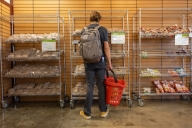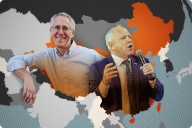You have /5 articles left.
Sign up for a free account or log in.
When Syrian government forces first began to fire on peaceful protesters, “Dr. A.” criticized the Bashar al-Assad regime in front of her students. For that she found herself under investigation by security forces. One colleague said to her, “The government is more afraid of you than of 1,000 or 2,000 demonstrators in the street.”
“The regime is afraid of the academy because they know they might influence a huge number of people,” said Dr. A., who, like some others interviewed, asked that her full name not be used out of concern for the safety of her family in Syria. “People trust professors, trust academic staff.”
Dr. A., who has since fled Syria and is teaching at a university on the West Coast, is one of 16 Syrian professors who have received Scholar Rescue Fund grants since the uprising began in March 2011. The grants, administered by the Institute of International Education, provide funding for scholars at risk to accept temporary appointments at host universities abroad.
In September, IIE, the Illinois Institute of Technology and Jusoor, an organization dedicated to economic development in Syria, jointly announced a $2 million commitment for fellowships and scholarships for Syrian scholars and students, and set a goal of raising $3 million more. Since then, 35 universities, foundations, associations and government agencies have together pledged an additional $1.3 million for fellowships for professors or scholarships for students, or both. For example, the University of Notre Dame Law School can this be "the University of Notre Dame' Law School"?committed to offer one full and two partial scholarships to Syrian students and to host one threatened scholar, a commitment worth more than $100,000, while the Washington, D.C.-based Richard Lounsbery Foundation pledged to fund fellowships for up to four threatened scholars. Central European University, in Hungary, situate this geographically? and the University of Edinburgh have also committed to offer full scholarships to several Syrian students.
The stories of the first Syrian grantees provide a rare window into a higher education system that has to a large degree shut down. Some Syrian universities are technically open, but little learning is occurring. Professors and students have been displaced, jailed or killed. Some have joined the Free Syrian Army. Those who remain at home are unable to safely navigate the roads, and have basic needs to attend to: families lack such necessities as fuel for heat or flour for bread.
“Higher education and research start to be a sort of unthinkable luxury,” said Talal Al-Mayhani, a medical doctor and Ph.D. student in neuroscience at Cambridge University who is active in the nonviolent Syrian opposition movement. Al-Mayhani, a founding member of Building the Syrian State -- a political organization that hopes to develop a civil democratic society -- ID this? dl had previously been invested in improving research capacity in Syria. In 2009, in his capacity as president of the Arab Society at Cambridge, he organized a conference on scientific research in the Arab world, and he subsequently helped to establish the Aleppo University Unit of Cancer Research.
In spring 2011, the unit launched a clinical study to determine correlations between the amounts of particular proteins in tumors and patient outcomes – work that has since the start of 2012 come to a halt. Doctors and patients who don’t live within walking distance can no longer reach the hospital. Economic sanctions, directed against the Assad regime, have cut off the availability of chemicals and other research supplies.
“We still have a lot to do to improve our higher education system in normal circumstances,” Al-Mayhani said. “You can imagine now.”
The Scholar Rescue Fund’s philosophy is to provide short-term fellowships to threatened scholars so they may return to their home countries to help rebuild universities and societies when conditions improve. If a return remains impossible, they can use the fellowship period to pursue a longer-term opportunity elsewhere in the world. The fellowships are for one year with the possibility of a one-year renewal. IIE provides up to $25,000 per scholar, which host universities must match with an equal or greater sum.
Jim Miller, executive director of the fund, said that academics have a special obligation to help their fellow academics in crisis. “There are organizations that provide humanitarian relief, in terms of food and shelter and so forth; there are organizations for physicians – Doctors Without Borders, Physicians for Human Rights. I think it’s the academic community that needs to respond to help fellow academics,” he said.
The parallel effort to fund scholarships for Syrian students whose education has been disrupted is also well under way. The Illinois Institute of Technology has committed up to 50 $25,000 scholarships to Syrian students, 14 of whom began their studies this past semester.
One scholarship recipient, a junior electrical engineering major at IIT, previously studied at Aleppo University. “The very last year it was so terrible,” the student said. “There were many protests inside the university; it was such a good environment for protests or for demonstrations because we all know each other and we can all coordinate with each other.” As he recalled, he would be sitting in a lecture when it would be interrupted by a demonstration, and the regime forces would arrive and begin arresting students. The situation worsened: lectures were canceled for the month of May.
The student heard about the scholarship at IIT this summer; within about a month he had been accepted and had safely crossed the border into Turkey, where he applied for a visa from the U.S. consulate in Istanbul. He found the adjustment to the U.S. educational system to be difficult – he’s accustomed to lecture-based classes with single, high-stakes final exams – but said things got easier as the semester progressed. With his fellow Syrians on campus he has helped to form a group dedicated to raising awareness of what’s happening back home.
“Studying here in the U.S. is a very exceptional opportunity for me, and I believe that this responsibility will make me work much harder and then go back to Syria to help my country rebuild,” he said. This semester he earned a 4.0.








